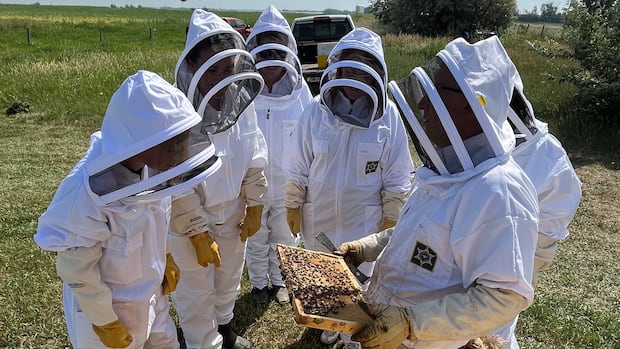A beekeeping expert in Alberta is conducting a trial on an insulated hive that he believes could benefit the struggling Canadian beekeeping sector. Sheldon Hill, located three hours southeast of Calgary, is exploring the potential of an Australian-made product that could revolutionize beekeeping practices.
According to Hill, sensor data indicates that bees can better regulate the internal environment of the hive with the insulated setup, leading to improved hive strength and increased honey production. However, convincing the industry, which typically resists significant changes, may pose a challenge.
Hill, who previously worked as a commercial apiarist in Saskatchewan for thirty years, has transitioned to an educational and research role with the Prairie Rose School Division in southeast Alberta. In collaboration with Medicine Hat College’s Centre for Innovation, he is conducting a year-long comparison between a HiveIQ system and a traditional wooden hive at Neubauer Farms near Medicine Hat.
The pilot project began in May and extended through the crucial summer honey production phase. While Hill emphasized the need for further large-scale research, he hopes that beekeepers, often hesitant about new technologies, will recognize the benefits of insulated hives.
The HiveIQ, developed by third-generation beekeeper Victor Croker to address extreme heat in the Australian outback, is now being tested globally, including in Alberta by Hill. The innovative use of polystyrene insulation aims to help bees regulate hive temperature effectively in both warm and cold seasons.
Insulated hives play a vital role in maintaining optimal conditions for bee colonies, especially during the spring buildup for summer honey production. Nathan Reid, from HiveIQ, highlighted the significance of Hill’s work in initiating the adoption of insulated hives in Western Canada.
Although insulated hives have been available for some time, many Alberta beekeepers are hesitant to switch due to cost concerns and attachment to traditional methods. Lance Dubeau, a fourth-generation beekeeper in St. Lina, mentioned the substantial investment in existing wooden equipment, making it challenging to transition to pricier alternatives like the HiveIQ models.
While some hobbyist beekeepers like Steven and Simone Dold prefer traditional woodenware due to its flexibility and cost-effectiveness, they acknowledge the potential benefits of insulated hives for newcomers. Hill recognizes the industry’s resistance to change but sees an opportunity for a Canadian-specific solution to accelerate adoption.
As Hill continues his research, he plans to share his comprehensive findings upon completion in May. The potential impact of insulated hives on the Canadian beekeeping industry remains a topic of interest and discussion.



